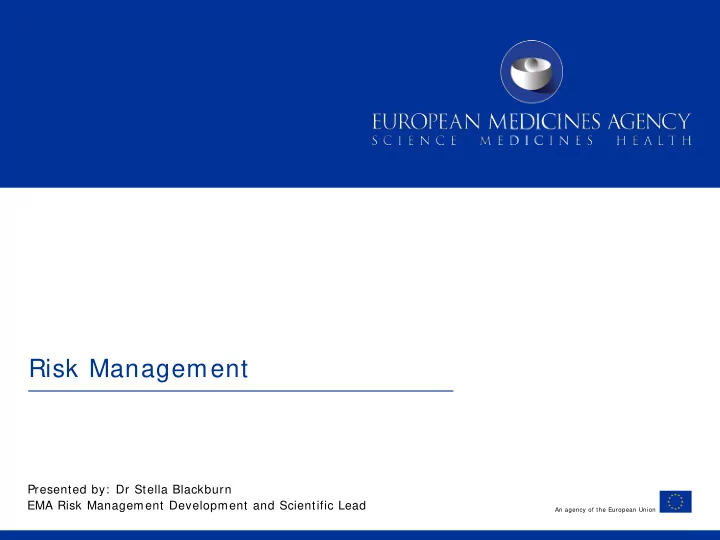

Risk Management Presented by: Dr Stella Blackburn EMA Risk Management Development and Scientific Lead An agency of the European Union
Topics Some Pharmacovigilance concepts Why don’t we know all the side effects of a medicine? What are the new requirements for risk management plans What does a risk management plan look like How does it affect patients? 1
The Drug Developm ent Program m e Cost of $1.3 - $11 billion Median time 11 years (range 3 - > 25 years) Median 1480 patients exposed (range 129 - 9,400)
What we know at the end of the clinical trial programme Efficacy
What we don’t know Efficacy What happens when the drug is used in normal practice What is its adverse event profile
Peopl eople of e often ex en excluded uded from om c clini nical cal tr tria ials Young Elderly W om en of childbearing age Pregnant w om en Certain ethnic groups
Peopl eople e of often en ex excluded f uded from om c clini nical cal t trial als people with concomitant disease cardiac disease renal disease hepatic disease multiple impairments people on concomitant medication
Other ADRs which are unlikely to be identified in clinical trials adrs which have a long latency adrs which need prolonged exposure adrs due to cumulative effects adrs which are rare adrs which mimic common diseases
When to licence? W e w ant drugs to be as safe as possible Know ledge about drug W e need access to new m edicines as soon as possible Tim e 8
The Positive Benefit Risk Balance Oh * * * * * ! the benefit risk balance has gone down to 4.3
What we actually mean At the tim e the m edicine is authorised, the benefits outw eigh the risks for the average patient in the approved indication 10
The Risk management System Definition: a set of pharm acovigilance activities and interventions designed to identify, characterise, prevent or m inim ise risks relating to m edicinal products, including the assessm ent of the effectiveness of those interventions
New RMP structure Part I Product(s) Overview Part II Safety Specification Part III Pharmacovigilance Plan Plans for post-authorisation efficacy studies Part IV Part V Risk Minimisation Measures Summary of the RMP Part VI Annexes Part VII RMP is substance based
Information Flow in the RMP Product Overview Safety Specification Pharmacovigilance Plan Plans for post-authorisation efficacy studies Risk Minimisation Measures Summary of the RMP
Safety specification what is known Identify: what is not known Drug Target population Disease Pharmacodynamics Who was studied? Natural history Pharmacokinetics Who wasn’t studied? Epidemiology How will it be used? Risk factors? What events occur Adverse event profile What events can we as part of disease? Class effects? expect in this population? Interactions? Level of confidence? Important identified risks Important potential risks Important missing information Safety concerns
Part I I I : Pharm acovigilance Plan Safety concerns Risk Min Measures I dentify and characterise Additional PhV activities Routin e Measure active surveillance PhV effectiveness case control studies activities cohort studies record linkage ( eHR) drug utilisation clinical trials Pre-clinical studies
Part I V : Plans for post-authorisation efficacy studies Applicability of efficacy to all patients in the target population List of post-authorisation efficacy studies
Part V: Risk Minim isation Measures Safety concerns Prevent or m inim ise Additional Risk Routine risk Minim isation m inim isation m easures Legal status Controlled distribution Pack size Educational m aterial SPC Patient alert card Package leaflet Patient m onitoring card Labelling Training program m es
Summary of Product Characteristics (SmPC)
Package leaflet 19
Product Labelling
Part V: Risk Minim isation Measures Safety concerns Prevent or m inim ise Additional Risk Routine risk Minim isation m inim isation m easures Legal status Controlled distribution Pack size Educational m aterial SPC Patient alert card Package leaflet Patient m onitoring card Labelling Training program m es
Summary of the RMP Possible options/ tools to communicate information on the RMP 1. Updated EPAR summary template – Incorporate key information on the main safety concerns and measures taken to mitigate the risk 2. Produce a stand-alone RMP summary in lay language 3. Tabulated information in the assessment report 22
How does the RMP affect patients? As a patient Routine risk minimisation Additional risk minimisation Providing input into the RMP Is the risk too great or should patients have the choice? Balancing needs for access with needs to minimise risk Is the educational material understandable? 23
Recommend
More recommend